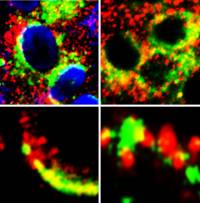
Images of cells showing close proximity (yellow) of GRP78 (green) with Spike protein of SARS-Cov-2 (red) (left panels) and ACE2 (red) (right panels).
The swift development of vaccines has provided a vital tool to combat the spread of the deadly SARS-CoV-2 virus, but challenges to reaching herd immunity posed by the rise of new mutations and the inability of immunosuppressed people to develop an effective immune response following vaccination point to a need for additional solutions to maximize protection.
A new study by Keck School of Medicine (KSOM) researchers published in the Journal of Biological Chemistry reveals how therapies targeting a molecular chaperone called GRP78 might offer additional protection against COVID-19 and other coronaviruses that emerge in the future.
Chaperones like GRP78 are molecules that help regulate the correct folding of proteins, especially when a cell is under stress. But in some cases, viruses can hijack these chaperones to infect target cells, where they reproduce and spread. GRP78 has been implicated in the spread of other serious viruses, such as Ebola and Zika.
Read the rest of the story, which first appeared on the Keck School of Medicine (KSOM) News website. Leading image: Senior authors Amy S. Lee, PhD (Left), Keigo Machida, PhD (Center), Parkash Gill, MD (Right) Keck School of Medicine of USC (photos courtesy Don Milici and Richard Carrasco). Scientific image provided by research study lead author Anthony Carlos, Ph.D., of Keck School of Medicine of USC.
